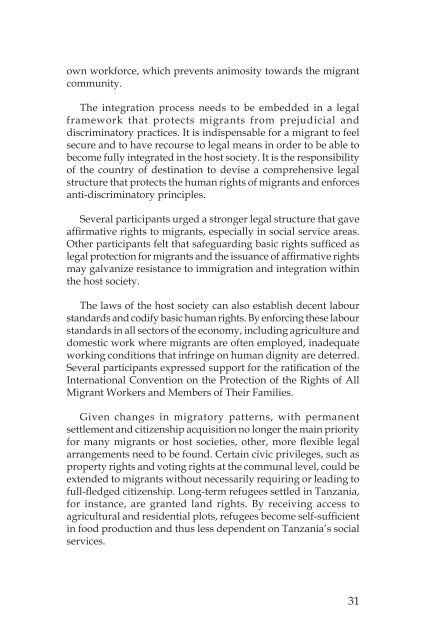Link - IOM Publications - International Organization for Migration
Link - IOM Publications - International Organization for Migration
Link - IOM Publications - International Organization for Migration
You also want an ePaper? Increase the reach of your titles
YUMPU automatically turns print PDFs into web optimized ePapers that Google loves.
own work<strong>for</strong>ce, which prevents animosity towards the migrant<br />
community.<br />
The integration process needs to be embedded in a legal<br />
framework that protects migrants from prejudicial and<br />
discriminatory practices. It is indispensable <strong>for</strong> a migrant to feel<br />
secure and to have recourse to legal means in order to be able to<br />
become fully integrated in the host society. It is the responsibility<br />
of the country of destination to devise a comprehensive legal<br />
structure that protects the human rights of migrants and en<strong>for</strong>ces<br />
anti-discriminatory principles.<br />
Several participants urged a stronger legal structure that gave<br />
affirmative rights to migrants, especially in social service areas.<br />
Other participants felt that safeguarding basic rights sufficed as<br />
legal protection <strong>for</strong> migrants and the issuance of affirmative rights<br />
may galvanize resistance to immigration and integration within<br />
the host society.<br />
The laws of the host society can also establish decent labour<br />
standards and codify basic human rights. By en<strong>for</strong>cing these labour<br />
standards in all sectors of the economy, including agriculture and<br />
domestic work where migrants are often employed, inadequate<br />
working conditions that infringe on human dignity are deterred.<br />
Several participants expressed support <strong>for</strong> the ratification of the<br />
<strong>International</strong> Convention on the Protection of the Rights of All<br />
Migrant Workers and Members of Their Families.<br />
Given changes in migratory patterns, with permanent<br />
settlement and citizenship acquisition no longer the main priority<br />
<strong>for</strong> many migrants or host societies, other, more flexible legal<br />
arrangements need to be found. Certain civic privileges, such as<br />
property rights and voting rights at the communal level, could be<br />
extended to migrants without necessarily requiring or leading to<br />
full-fledged citizenship. Long-term refugees settled in Tanzania,<br />
<strong>for</strong> instance, are granted land rights. By receiving access to<br />
agricultural and residential plots, refugees become self-sufficient<br />
in food production and thus less dependent on Tanzania’s social<br />
services.<br />
1

















